

Registered Charity No 1075342

Reviews of Meeting Points Presentations
November 2011 - June 2012

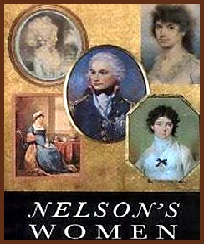
All know of Nelson the great Naval Hero and his career and battles, during which
his leadership and predatory instincts were dedicated to destroying the French and
Spanish Fleets.
The story of his personal life turns out be equally dramatic. The talk outlined his
relationships with women, in particular, the woman in the scandal he created by deserting
his loving and faithful wife to set up a 'Menage a trois' with Sir William Hamilton
and his notorious wife Emma, by whom he had the daughter he had longed for and to
whom he was devoted under a veil of secrecy.
Commander
Alan York, OBE., Retired Naval Officer

“Nelson's Women”
May 2012 Meeting
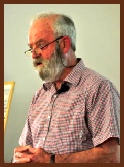
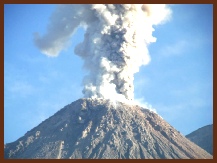
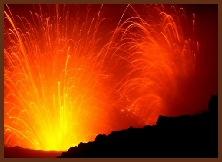
We Have a Lot to Thank Volcanoes For …
To those that attended the talk on Volcanoes in November 2011, Ian Platt (OU Graduate in Geology) has written this short article with a more positive view of volcanoes
The talk on “Volcanoes” given by Robin Miller to the Purbeck U3A Meeting Points event on 24th November 2011, contained a lot of information concerning the destruction and deaths caused by volcanic eruptions, and may have sent many people home with the impression that these natural (and unstoppable) phenomena are all doom and gloom. Mr.Miller failed to make any attempt to present a balanced view on the subject, and I feel the need to provide information to the readership that should give you cause to think more kindly of them! Here are just three of the main reasons for being thankful for volcanoes:
1. About 4500 million years ago, the proto-Earth was accumulating chunks of material that had condensed down from the original Solar Nebula that finally became the Solar System that we know of today. Prodigious amount of heat was generated by this accretion process, and among the heavy elements that sank to the centre to form the Earths core was a large amount of radioactive material. The heat from this resulted in the surface of the early Earth being a seething mass of volcanic activity. One of the major products was the degassing of trapped volatiles among which would have been copious quantities of steam. As we all know steam cools to form water, and one eminent geologist has estimated that it may have rained continuously for over a thousand years from this activity. This process was the source of much of the water present on planet Earth today. Without liquid water nothing can survive.
2. Much later, estimated at about 700 million years ago, the existing ice caps at both poles steadily expanded outwards until they finally covered the entire Earth. It was completely blanketed in ice, and this is referred to as the time of ‘Snowball Earth’, and there is evidence that this happened several times up until about 580 million years ago. The exact reasons for these events are not clear, but whatever the cause, when the abnormalities were rectified, the Earth continued to remain completely frozen over because a very high percentage of the incoming solar radiation that would have otherwise helped to warm it up, was reflected back into space. It is estimated that 95% of all life was extinguished during
these periods. And what saved us? Volcanoes. The steady outpouring of mostly carbon dioxide and the build-up of these and other greenhouse gases gradually melted the ice sheet from beneath, returning Earth to normalcy once again.
3. And finally, volcanoes act today as a sort of thermostat for planet Earth. They do this because the oceans (produced by volcanic action) absorb much of the carbon dioxide, and this is trapped by plankton that use it to grow. When the plankton die they fall to the sea floor and their carbon is gradually converted into rock. This in turn is recycled at subduction zone plate boundaries, where the subsequent volcanic activity erupts the trapped carbon dioxide back into the atmosphere. This whole process helping to regulate the temperature vital to complex life.
The indisputable fact remains that without volcanoes you and I wouldn’t be here!


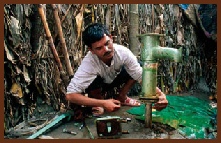
Jacqueline Sims has a background in International Relations, Public Health, and Medical Anthropology. Her career at the World Health Organisation in Geneva involved her in environmental issues that compromise human health in the developing world, such as food, water and air quality.
Drawing on her personal experiences, her talk explored long-standing environmental health threats and why they persist today despite the scientific advances of recent decades.
Jacqueline Sims (formerly of WHO)
The World Health Organisation - Environment, Health and Development
June 2012 Meeting
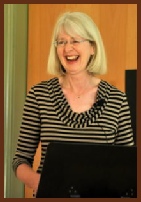

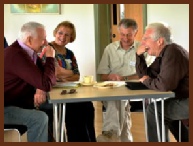
Members before the meeting
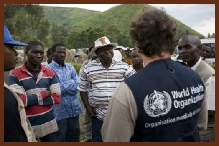
The talk specifically addressed the 2015 global development targets in respect of water and sanitation, pointing out that, while good progress is being made towards the drinking-water target, the world will
miss the sanitation target by a wide margin. Today, 2.5 billion people lack basic sanitation, and over 600 million do not have acceptable sources of drinking-water. These people continue to be at risk from the numerous water and sanitation-related diseases that cause high morbidity and mortality among disadvantaged populations.
David Haysom
Swanage Weather
Past & Present
April 2012 Meeting


Dr Chris Spilling
Evolution and
the Galapagos
March 2012 Meeting

John Challis
Enduro Africa 2011
February 2012 Meeting
It was a great combination of travel, adventure, other cultures, humanity, and altruism. After the talk donations were solicited for the charity Touch Africa, which was supported by the event.
John would like to say “a very warm thank you to those that generously contributed to a cause which I know to be worthwhile, is regularly monitored and which has a good track record. It will help give a' leg up' to those who have the potential but have so far been denied the opportunity. Make school a better place and hopefully in the fullness of time South Africa will become a better place!”

Review of the “Play Five” meeting held in January 2012
It sounded quite intriguing: PLAY FIVE - Watch, Listen then Play, led by conductors Dave and Di Cook. What did it mean exactly? Real instruments? What if you didn't know your G sharp from your A flat? Would it be possible to hide at the back? I need not have worried. This was my first Meeting Points attendance and it was a thoroughly enjoyable occasion. Dave was a relaxed and engaging personality who talked and played us through a variety of instruments, demonstrating the main ways we can all make music- banging, blowing, plucking, scraping and of course singing.
We all appreciated his expert use of the aforementioned techniques on guitar, recorder, bassoon and violin ably
accompanied by Di on the piano and tambourine. Equally we loved his demonstrations of pitch on improvised instruments such as bottles, lengths of wood, rubber piping and straws. Then the audience was invited to have a go on these carefully tuned improvised instruments. Nobody held back and after ten minutes spent practising, each group played "When The Saints Go Marching In". As each player was responsible for only one note this was not too difficult. The rest of us who did not manage to get our hands on an instrument were turned into an ad hoc backing group for a song about Uncle Joe's mint balls sung to the tune of "My Old Man's a Dustman".
Looking around, I was struck by how much fun everyone was having; the power of music to bring people together?Perhaps. The wonderfully laid back but informative duo of Dave and Di? Certainly. Thanks to them and thanks to the organisers whose work is appreciated. If you have not been to a Meeting Points occasion yet, why not give it a go. Oh and the coffee's not bad either.













